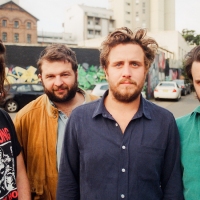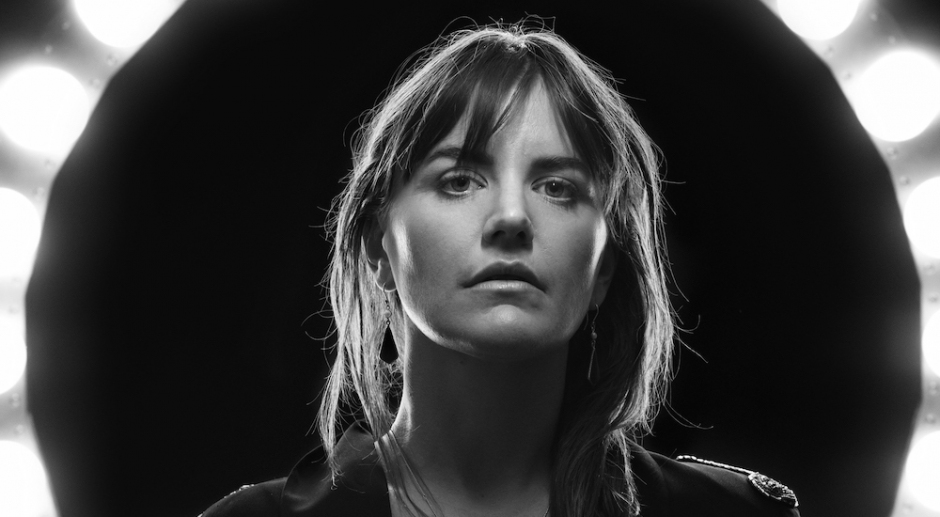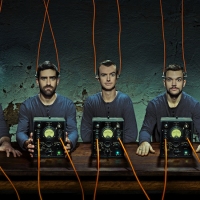 Bad//Dreems Have Had A Gutful, But They're Not A Political BandGuitarist Alex Cameron talks not politics, creating safe spaces to rock in and still working full time jobs.
Bad//Dreems Have Had A Gutful, But They're Not A Political BandGuitarist Alex Cameron talks not politics, creating safe spaces to rock in and still working full time jobs.

Setbacks, Safe Spaces & Sexism In The Music Industry - A Conversation With Abbe May
Abbe May takes a break from writing her new album to play SOTA Festival this weekend.
Back when I was a frothing 20ish-year-old I used to drive up from Mandurah to Perth every other weekend to see this cool new band called The Fuzz play at Amplifier. I was in that phase of life where I'd just discovered there's heaps of cool ROCK AND ROLL music that's just a simple click of the commercial radio station away. And I had to prove how much I loved it by driving an hour up to the city, bringing a few beers along for the ride, smashing them before going in and then sleeping in the car with a mate for a few hours post-Amps until it was safe(r) to drive home.
The peak of this was one night after a show I shared a glass of red wine with frontwoman Abbe May, and told her how fucking sick her band was. New-to-going-gigs Troy was incredibly chuffed with himself. That band would go on to slowly dissemble over the coming years, leaving May to carve a significant solo career, one that now sits at four albums - with a fifth very close to being finished. Over the course of that career Abbe May has been in constant sonic evolution, not unlike the David Bowies and Madonnas of the past, in a way that now finds her recording a "very 90s-sounding album...more Salt N Pepa than it is Nirvana." A far cry from those grungey rock'n'roll days at Amplifier to be sure.
One thing that May has kept constant over that time period however, is her penchant for being outspoken on a number of social issues, including the environment, same sex marriage, and more recently, creating safe spaces for the LGBTQIA+ community at her month-long Clam Jam series of gigs. May has never been afraid to speak up for the smaller voices out there, and with that in mind I was incredibly excited to chat to her recently about the new album.
What ensued was easily the most illuminating chat I've had with an artist in 2017, if not ever. In it I learned more about an incredibly rough recent period in her life (one that saw her step fully away from music after a complete nervous breakdown), her early days in an industry that is inherently sexist, her constant efforts to make people from all walks of life feel comfortable at rock shows, and her desire to die on stage at the ripe old age of 96 with "some kind of awesome guitar strapped to me."
There's a lot to get stuck into below (crazy for an article on the internet, I know), but I implore to take your time with it, becuase I think you'll find it really rewarding.
Just like that time I had a glass of red wine with the lead singer of my then-favourite band before passing out in some shitty car park just to make sure I was okay to drive.
Abbe May on her next record and evolving as an artist:
It’s massively different. The production, the songwriting, the themes are all really different. It’s probably my most poppy record. There’s also a lot of gospel and soul in it, but mostly it’s like a 90s R&B record I suppose. With just a hint of grunginess and soul to it. It’s a three year chunk of my life. When I was making Design Desire, I was listening to different music and working with different types of musicians. At the time in Perth all you could get was psychedelic musicians, in the aftermath of that great Tame Impala rise, no one was playing anything else. And then we moved on to Kiss My Apocalypse. And it was the same producer, but it was two years after the last one, and you’re a completely different person, you’re listening to different stuff…
I’ve never understood how you can keep making the same record over and over again. I mean I admire it in a way. But the artists that I really like keep evolving. People like PJ Harvey, Beck, Radiohead, Nick Cave… that kind of thing. To me there’s a skill to be able to do something different rather than getting stuck. What I’ve discovered as well is that its much more financially viable to stay doing the same thing, but I just got really fucking bored with rock’n’roll. So I got into a lot of hip hop and things like that. Each album has to be better than the last one. It’s a pretty weird album. I think this is the fifth one and by this stage nobody thinks I’m gonna make the same one again. So this is a pretty weird album… It’s a very 90s sounding album, but not in the way you would think. It’s more Salt N Pepa than it is Nirvana.
On the importance of having a manager:
The reason I stopped making music is because I hate the industry side of it and you really do need a buffer. And because I’m not competitive I just don’t have this drive… I’m just happy to make music and everything else seems to fall by the way side. So we’re lucky to have the manager to force us to finish it... The industry really does suck the love out of it. There’s just something wrong. But that’s why you have a buffer zone. Don’t manage yourself. Get a manager. I’ve been lucky on that front.
The experiences that lead up to album #5:
I had a seizure which took two years to recover from and I had massive anxiety and depression and was bordering on suicidal after it because my nervous sytem had completely destroyed itself. It was a real chemical imbalance. And my 10-month nephew had a four-week stint in ICU with a really life threatening condition which was really traumatic. My best friend, she got cancer. I just found myself turning to pop music more and more just to remove myself from the heaviness of what I was going through. As somebody who loves these people who were in life threatening situations, and also just to recover from my own nervous breakdown... So this record is the end of three years of pretty brutal stuff going on. And I just didn’t feel the need to make dark music because I found a kind of epiphany through good pop.
On navigating sexism and the music industry:
The industry is really rough. You’re judged on a number of factors, including looks and age. There’s a lot of people who will fuck you and leave you dry. It’s a pretty intense industry. There’s a lot of drugs, there’s lot of womanising, fake friends... When you’re riding high and having success you’re surrounded by people who are celebrating with you. But when stuff goes a bit wrong, you’d be surprised how few stick around... I just wasn’t that well, and the last thing you need when you’re not feeling well is fake people around you. And also just people who are just trying to get what they can out of you. The industry only really wants you if you’re making money, which is what an industry is about, and that’s why I have a manager now.
The older you get as well... I’m only 33, I’m not exactly an old lady yet. But I kind of refuse to die. At least creatively I’m not gonna roll over and die. There’s a lot of value placed on youth, particularly with women in the industry, and it’s in every industry. You see journalists and newsreaders shafted off the front desk because they hit a certain age and actresses can’t get jobs after 30. It’s pretty intense, but I think I’ll just keep going and the music should speak for itself.
I’ve never found it hard as a woman particularly, but I am not a particularly traditional girl either. I think it is an incredibly sexist industry and I think women are basically exciting and interesting to the men who run this industry. And it’s only for a short period of time while you’re young and pretty. And that’s kinda the model of what the industry thinks will make money. Understanding that is key I think for women today. To understand that this is an industry that’s going to play you. And it is going to use you to make money. That’s okay because once you understand it you’re not hurt by it.
On the early days of her career:
I had tremendous luck. I had a real stroke of luck at about 22/23 – I got invited out to play a concert tour, and I made what would be the equivalent of about $20,000 today which meant I could quit my job and focus on music. And so what I have done that a lot haven’t been able to do at the start of their careers is focus on making music. What I see hindering other artists is that work gets in the way. It’s about learning and getting better at making music and understanding it and expressing it and recording – there’s so many facets to it that you just need to dedicate your life to it. I think I was lucky that I had that boost at the start, and any time that’s come near to broke time something comes along.
On her Clam Jam parties and celebrating/supporting female talent:
The reason behind Clam Jam... The people who assisted me [in the begging] mostly were women. And I had a lot of people high up in places. Some of them at touring festivals and record labels and grant bodies... A lot of women I can’t name because they did it for me as a way that women looked after each other. And that’s what I think we should be doing. And all of the men I know agree we’ve gotta give each other a leg up. And that’s what Clam Jam is about. Putting great female artists in front of an audience I already know really like this type of music. So it’s something that’s evolving and I’m open to suggestions on how to run it better and make it be more inclusive and welcome to more people.

On making gigs a safe space for everyone:
I have had some girlfriends tell me that they are getting really sick of getting groped in mosh pits and things like that. But because I don’t go out I don’t experience it, but I’ve heard it so many times from my friends, and it’s pretty fucking awful. Because I’m gay, I’m really passionate about being open and clear about my sexuality, because visibility was something I didn’t really see when I was a young person, not being sure about if it was okay to be gay. So back 10 years ago no one was really openly gay in the scene, and I don’t really remember one person who was openly gay. But now it’s just not even a thing.
But the thing we really focus on is that it’s really clear, even if it’s a female-dominated lineup that’s trying to support women, that all members of the LGBTQIA+ community are welcome. And feel welcome. And know that our shows are a safe space, and if anything is happening they can tell the bar staff, they can tell us. We’ll stop the show if they need us to. It’s a promise and it’s heartfelt and it’s important that more of us do that. I’d like for anyone who’s feeling uncertain about whether or not it’s okay to be who they are that it’s okay to be themselves at our shows. The only people unwelcome are arseholes.
On the new live setup at SOTA Festival:
Yeah we’re gonna play a handful of songs from every album, including some new stuff as well. I’ve got a trio that includes my brother KT Rumble and Matthew Wright on drums and we have lots of fun. I’m pretty proud of this lineup, which we’ve been developing for the last two years, and I’m excited to unveil the band in a more public setting beyond my own shows. And to play some of the new stuff on the record, which is getting close.
Follow Abbe May: FACEBOOK
 Bad//Dreems Have Had A Gutful, But They're Not A Political BandGuitarist Alex Cameron talks not politics, creating safe spaces to rock in and still working full time jobs.
Bad//Dreems Have Had A Gutful, But They're Not A Political BandGuitarist Alex Cameron talks not politics, creating safe spaces to rock in and still working full time jobs.
 "We’re close and love what we’ve got." Karnivool talk album #4 ahead of SOTA FestivalThe state of Karnivool to come.
"We’re close and love what we’ve got." Karnivool talk album #4 ahead of SOTA FestivalThe state of Karnivool to come.
